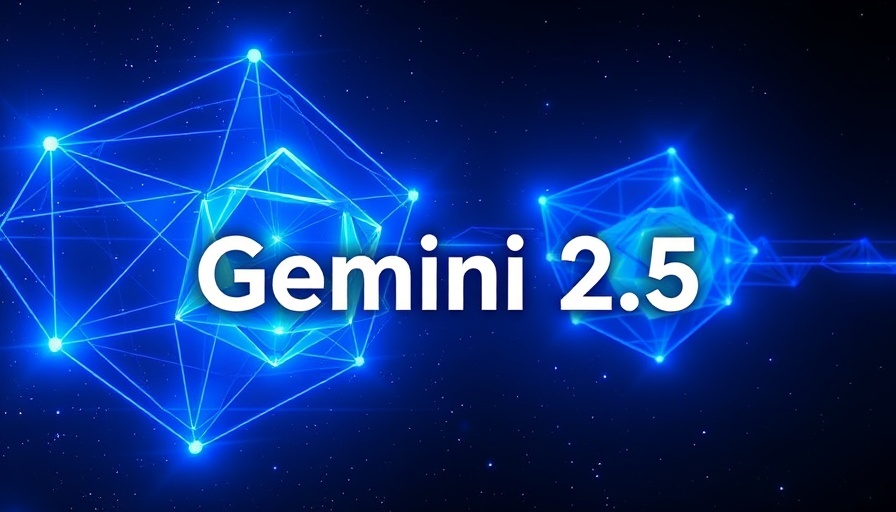
A New Era in AI Reasoning: Gemini 2.5 Unveiled
On March 25, 2025, Google launched its latest innovation in artificial intelligence: Gemini 2.5. This new family of AI reasoning models aims to revolutionize how AI systems process information by incorporating a "thinking" phase before generating answers. This leap is particularly significant as it signals a shift in how AI can be utilized across various fields, enhancing not just the accuracy but also the contextual understanding of responses.
What Makes Gemini 2.5 Stand Out?
Gemini 2.5 Pro Experimental is the flagship model in this new lineup, integrating advanced reasoning capabilities that set it apart from its predecessors. Available to developers through the Google AI Studio and the paid Gemini Advanced app, this model is Google’s bold response to the competitive landscape shaped by OpenAI’s earlier releases, notably the o1 model launched in September 2024. The incorporation of reasoning means Gemini 2.5 can now tackle complex tasks in coding and mathematics with unprecedented efficiency.
The Technical Edge of Gemini 2.5
Google's marketing highlights the model's performance on various benchmarks. For instance, Gemini 2.5 Pro achieved a score of 68.6% on the Aider Polyglot evaluation, demonstrating strong capabilities in code editing—surpassing leading AI models from OpenAI and Anthropic. These scores emphasize the potential for Gemini 2.5 to aid developers significantly in writing and refining code.
Moreover, on the SWE-bench Verified test, while Gemini 2.5 Pro scored 63.8%—worthy of note as it bested some competitors—it still fell short compared to Anthropic’s Claude 3.7 Sonnet. The competition is fierce, showcasing varying strengths among AI models as they cater to specific tasks.
Implications for the Future of AI
As AI reasoning models, like Google’s Gemini 2.5, become more commonplace, several implications emerge for the future. One of the most significant is the enhancement of AI agents—systems capable of executing tasks without human intervention. The robust processing capabilities of Gemini 2.5, which can handle a massive context window of 1 million tokens, hint at a future where AI can manage extensive streams of information and provide insights that are contextually rich and logically sound.
The Competitive Landscape: A Shared Vision?
The landscape of AI reasoning models is progressing rapidly, leading to the emergence of key competitors like Anthropic, DeepSeek, and xAI. Each company is striving to outpace the other by refining their models' reasoning capabilities. This ongoing race highlights not only the competitive nature of technological advancements but also the collective push toward more human-like reasoning in machines. As companies invest heavily in these technologies, the potential for transformative applications in business, education, and everyday life grows.
What Lies Ahead for AI Enthusiasts?
For AI enthusiasts, the release of Gemini 2.5 marks an exhilarating chapter in AI's evolution. It represents a convergence of computational power and innovative reasoning strategies that can tremendously benefit numerous industries. As these models become more sophisticated, they could redefine tasks from software development to customer service and beyond.
Despite the promising advancements, the associated costs of developing and running such advanced AI systems are likely to remain a barrier for wider adoption. Thus, the tech community is tasked with navigating how to balance these expenses while maximizing the benefits.
With Google promising more details on the API pricing in the coming weeks, it’s clear that developers and organizations interested in harnessing AI's full capabilities will need to stay tuned for further developments. As Gemini 2.5 and its successors begin to redefine what AI can do, the implications are nothing short of monumental.
 Add Row
Add Row  Add
Add 




 Add Row
Add Row  Add
Add 

Write A Comment